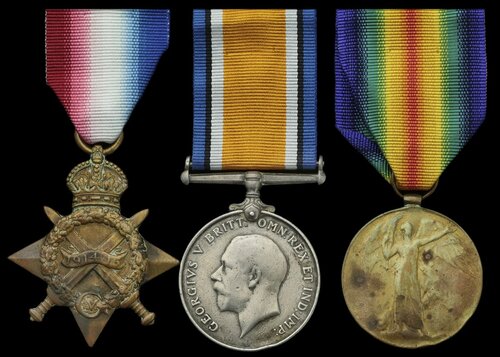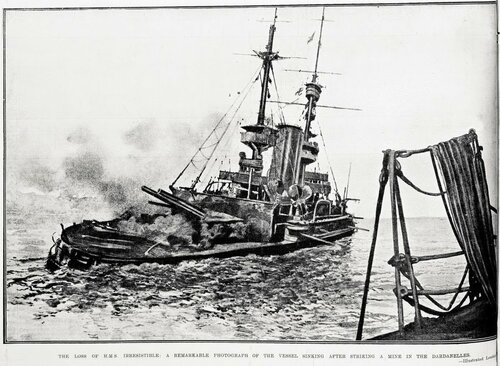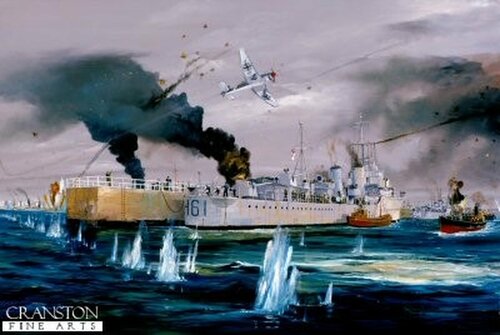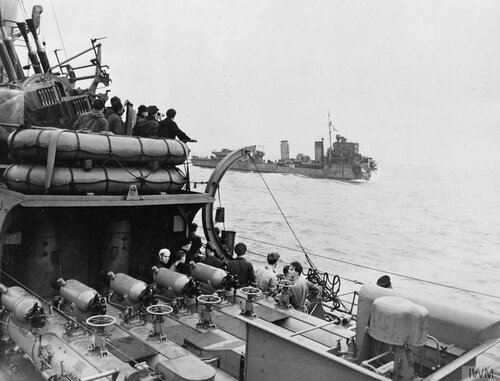Auction: 21002 - Orders, Decorations and Medals
Lot: 99
A notable survivor's Great War campaign group of three awarded to Able Seaman T. H. Griffiths, Royal Navy
Among those rescued after the mining and loss of the battleship H.M.S. Irresistible in the Dardanelles in March 1915 - around 150 of his shipmates became casualties - he was extremely fortunate to survive the mining of the destroyer Express in what became known as the 'Texel Disaster' in August 1940
The detonation of the mine blew Express's bows clean off with an immediate loss of four officers and 54 ratings: Griffiths was among the wounded
1914-15 Star (J. 25982 T. H. Griffiths, Boy 1, R.N.); British War and Victory Medals (J. 25982 T. H. Griffiths, Ord., R.N.), polished, nearly very fine (3)
Thomas Harold Griffiths was born in Edmonton, London on 26 April 1898 and entered the Royal Navy as a Boy 2nd Class in July 1912. By the outbreak of the Great War in August 1914, he was serving in the cruiser H.M.S. Hermione but, at the year's end, he removed to the battleship Irresistible.
Loss of H.M.S. Irresistible
In February-March 1915, 16-year-old Griffiths witnessed several prominent bombardments of the Ottoman forts; Irresistible also landed Bluejackets and Marines to destroy Turkish batteries and guns on three occasions, although it is not known whether he was among them.
A new attack was launched on 18 October. Irresistible joined the fray at 1439 hours, shortly after the French battleship Bouvet was mined and sunk in the straits; she and several other battleships attempted to suppress the Turkish guns that were firing on boats that were picking up survivors from Bouvet. Irresistible herself quickly came under heavy fire from the "Hamidieh I" Battery, which targeted her with four-shell salvoes. At 1514, Irresistible was rocked by an explosion, and by 1532, had begun to take on a list, prompting Admiral de Robeck to order her to withdraw to avoid further damage. At 1615, Irresistible, having idled her engines, struck a mine that caused extensive damage to the ship. The mine detonated under her starboard engine room, flooding it and killing all but three of the men on duty therein. The bulkhead that divided the starboard from the port engine room collapsed under the sudden weight of water, disabling that engine as well.
Unable to manoeuvre, with a list of 7 degrees to starboard, and down by the stern, Irresistible became a sitting duck for the Ottoman gunners. She drifted helplessly into range of Turkish guns, which laid down a heavy fire on her. Her main gun turrets began to malfunction, and she was obscured by smoke and spray. De Robeck ordered the battleship Ocean to take her under tow and pull her out of range of the Ottoman guns, and the destroyer Wear came alongside and rescued most of the crew - 28 officers and 582 men - despite the punishing Ottoman shelling. A group of ten men remained aboard to try to secure a line from Ocean but by the time Ocean closed it was apparent that Irresistible could not be saved. Her list had increased and the fire from the Ottoman guns had become very heavy, so the remaining men were evacuated and Ocean withdrew.
The Turks later reported that the derelict Irresistible had drifted closer to shore and suffered further severe damage from their shore batteries before sinking at about 1930.
Griffiths subsequent seagoing appointments in the Great War included the cruiser Blenheim (March 1915-December 1916), and the destroyers Colne (January-May 1917) and Shakespeare (May 1918-March 1919).
Further action: Dunkirk
Remaining actively employed between the wars, he was serving as an Able Seaman in the destroyer Express on the renewal of hostilities in September 1939. And he remained likewise employed until at least the end of 1940.
On 29 May 1940, Express towed the disabled destroyer Jaguar clear of a wreck in Dunkirk harbour and transferred many of her evacuees aboard before she could repair her engines later that day. The following day, Rear-Admiral Wake-Walker, commanding the ships involved in the evacuation, briefly hoisted his flag aboard her. She was damaged by bomb splinters on 31 May, but continued to ferry soldiers back to England. In fact, Express - and her consort Shikari - were the last ships to leave Dunkirk with troops on 4 June when the evacuation ended. She brought out 3,419 troops over the course of Operation "Dynamo".
The Texel Disaster
Otherwise assigned to the 20th Destroyer Flotilla, Express spent her time laying defensive minefields in British waters and offensive minefields off enemy coasts. And it was during just one such an operation that disaster struck.
On the evening of 31 August 1940, Express, Esk, Icarus, Intrepid, and Ivanhoe departed Immingham to lay an offensive minefield off Texel, with cover provided by three destroyers of the 5th Destroyer Flotilla. At 2307 hours, it became clear that the ships of the 20th Flotilla had entered a German minefield when Express struck a mine abreast 'B' gun, losing her entire bow up to the bridge. The detonation killed four officers and 54 ratings; one officer and seven ratings were later rescued by the Germans.
Esk and Ivanhoe, the closest ships to Express, closed to render assistance, while the other two destroyers turned hard to starboard and retraced their route to exit the minefield, according to standing orders. Five minutes after the first mine detonated, Esk's bow struck a mine and she came to a stop. Five minutes later Ivanhoe struck another mine that badly damaged her bow. At about 2320, Esk struck another mine amidships that detonated her magazines. By 0140, Express had managed to raise steam again and went astern to minimise the pressure of the water on her shored-up bulkheads.
The Admiralty dispatched nine M.T.B.s to go to the assistance of Express and Ivanhoe once they had been notified of the incident by Intrepid. Captain Louis Mountbatten of the 5th Destroyer Flotilla also came to the rescue, having received the report of a Royal Air Force Lockheed Hudson bomber that had spotted the two damaged destroyers about 0700, about 25 miles east of his position. The M.T.B.s reached the ships first, around 0800, and evacuated all of Express's crew.
Mountbatten's destroyers spotted Express around 0840, and Kelvin took her in tow, stern first, 20 minutes later. The tow cable, however, fouled one of Kelvin's propellers and had to be cut. Jupiter then took over the tow. The threat of aerial attack at 1945 forced Jupiter to slip her tow and allow one of the attending tugboats to take over the task. Express finally arrived at Hull in the early evening of 2 September 1940.
Among the wounded - his service record, refers - Griffiths was released 'Class A' in September 1945; owing to several stints in the cells for theft in back in 1916, he was not entitled to the L.S. & G.C. Medal.
Subject to 20% VAT on Buyer’s Premium. For more information please view Terms and Conditions for Buyers.
Sold for
£480
Starting price
£60











